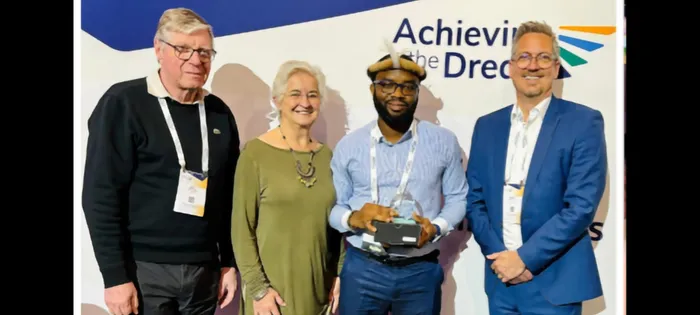Prestigious International Siyaphumelela Network Award for UKZN

From left, Dr Alan Amory, Siyaphumelela Leader; Jenny Glennie, Executive Director; Abdulbaqi Badru and William Moses, Managing Director: Education (Kresge Foundation) received the Siyaphumelela Network Award on behalf of UKZN. Picture: UKZN
The University of KwaZulu-Natal (UKZN) was awarded the prestigious International Siyaphumelela Network Award at the Achieving the Dream (ATD) Conference in Orlando, Florida, USA, recently.
The award recognises and honours the university for its role in advancing equity and driving student-centred transformation in South Africa while providing strategies and insights that enrich the global Siyaphumelela Network.
UKZN joined the Siyaphumelela Network 2.0 in 2019. This access and success network of South African institutions funded by the Kresge Foundation is managed by the South African Institute for Distance Education (Saide).
The Kresge Foundation is an international non-governmental organisation based in the US that supports post-secondary access and success for low-income, first-generation, under-represented students through the ATD network, with more than 200 US community colleges as members.
UKZN’s University Teaching and Learning Office (UTLO) is the custodian of the grant.
Professor Rubby Dhunpath, the founding director of UTLO, who recently retired, said joining the Siyaphumelela Network enabled UKZN to turn the gaze onto itself.
“We are acknowledging the possibility that student failure is also a consequence of institutional under-preparedness. Under this gaze, UKZN’s model of a continuous loop of academic professional and institutional development (CLIP) places evidence-based teaching and learning development at the centre of its efforts to remedy institutional under-preparedness,” said Professor Dhunpath.
The Kresge Foundation is currently phasing out Siyaphumelela Network 2.0, which comprises South African institutions working towards improving student access and success through data-driven, evidence-based practices. It is made up of 17 South African Higher Education Institutions (HEIs).
The foundation hosts the ATD conference as a community of practice for all ATD and Siyaphumelela institutions to share their successes, challenges, and experiences.
The conference celebrated its 20th anniversary this year. The Kresge Foundation sponsors a delegate from each Siyaphumelela Network institution to attend the ATD conference.
Abdulbaqi Badru, Principal Technology Consultant to the Deputy Vice-Chancellor of Teaching and Learning Portfolio, represented UKZN at the 2024 ATD conference.
Part of the programme was an awards luncheon, where Siyaphumelela member institutions were recognised for their contributions to the global network.
Mr Badru accepted the award on behalf of UKZN.
“It is an honour to receive this Siyaphumelela Network Award on behalf of UKZN. The award is a testament to the institution’s efforts, dedication, and hard work to improve access and the success of our students through various initiatives such as the Academic Monitoring and Support (AMS) and First-Year Experience programmes, digital literacy projects, and other psycho-social student support programmes,” said Mr Badru.
More than 2 000 delegates from the US, South Africa, and New Zealand, among other countries, attended the conference. The plenaries were predominantly practice-based discussions on how community colleges in the US create access and success opportunities for students towards degree completion, said Mr Badru.
“A key lesson learned is the need for institutions to change the narrative from glorifying completion rates to translating the numbers into students’ economic and social mobility. This can be achieved through strategic partnerships with industry, communities, and government agencies,” said Mr Badru.
“Furthermore, HEIs should support continuous learning so that students are given the opportunity to work and study simultaneously and not have to choose between paychecks and textbooks.”
Other informative sessions included the Dream Studios titled: Becoming an Adaptive Learning Organisation to Advance Student Success and AI, Digital Tools, as well as the Future of Higher Education, Ramification for Policy and Practice. In the midst of underlying educational concerns such as equity, racial, economic, and technological challenges, universities also need to encourage continuous learning among staff towards adapting to ongoing disruptions to Higher Education, added Mr Badru.
“Institutions benefit from a growth mindset and a systems-thinking orientation because institutional problems are interconnected. Human resources departments should advance beyond administrative functions and form strategic partnerships to support the mission of becoming a learning organisation,” said Mr Badru.
He added that the session on AI and digital tools concluded that they should be embraced and democratised in HEIs to ensure they are not agents of division among staff and students, and these tools should be governed through policies, standards and procedures.
Going forward, the Kresge Foundation is committed to supporting and accelerating student access and success in South Africa.
The Siyaphumelela Network 3.0, which commences in 2024, will be expanded to 20 institutions for the 2024-2026 cycle, added Mr Badru.